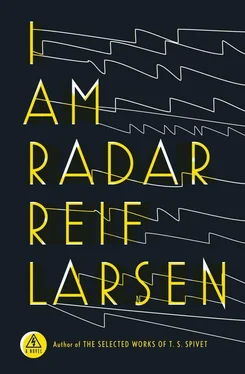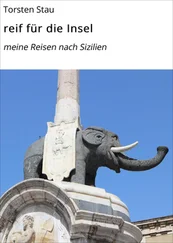“The bear won’t kill you. The bear cannot kill you. For this I give you my word. The only person who can defeat you is you.”
“I don’t take your word.”
“All right, then. We stand at an impasse,” said Leif. “If you don’t believe another man’s word, then what do you believe?”
The question caught Kermin off guard. He had come to Norway hoping that the trip alone would cure his wife of the strange sickness that continued to consume her. He did not know what had gone wrong between them; he could not point to a piece of their life and say, “This is the part that is broken.” He knew only that at some point, during some brief, quiet moment when he had not been paying attention, they had drifted off course, and they were now in uncharted waters. Kermin never claimed to know much in this world, but he did know that he must never lose Charlene, that without her he would never be whole again. And so he had tried to come to this place with an open mind, even if he knew in his heart that he had relinquished some vital part of himself by even setting foot here. Maybe this was what love had become: the slow act of giving up more and more until nothing of yourself remained. Yet when Leif had described the procedure to treat their son, something inside of him had snapped and recoiled — not because he believed the procedure wouldn’t work or that Radar might be harmed, but because he knew that there was a very real possibility that it would work, and that afterwards, nothing could ever be the same.
Through the shadows of the room, Kermin looked at the bear, who had not moved since their arrival, save for bobbing his head back and forth ever so slightly, giving him an air of reluctant wisdom.
Again the lantern of memory was lit, and Kermin was suddenly taken with a forgotten scene from his past: Once, when he was very young, he was walking through the woods alone, gathering white currants into a thrush basket for his mother’s preserves. He had not told his mother where he was going, because he knew she would never have let him go. The war had already been raging for two years, and she had forbidden him to wander, but he had wanted to surprise her with the basketful of currants, to make her smile again, just like she had done before his father left to go fight in the hills. Together they would dip the jars into the boiling water, mash up the berries, and make her famous preserves.
But somewhere along the way, Kermin had gotten lost. Scared and feeling feverish, he had stumbled into an unfamiliar clearing, and there, sitting in the sunlight, working at one of his paws, was a floppy-skinned brown bear. Kermin’s first thought was that it must be a man in a bear costume, for the bear’s gentle sentience was much too close to his own. And then the bear, startled by his sudden entrance, leaped to its feet and took several tumbling steps toward him. Kermin froze, not daring to move, his basket of currants trembling at his side. He could hear the bear’s ragged breath coming in snorts and sniffles. He realized that the creature was trying to smell him, trying to understand what kind of thing he was.
“I’m Kermin,” he had whispered. “I’m not a person.” He had meant to say “bad person,” but the word bad had gotten lost somewhere in the space between his mind and his throat.
The bear seemed to hear this. It moved its head back and forth, as if attempting to listen to him from both ears, and then it yawned a slow, wild yawn, peeling back the wet skin around its teeth. Kermin remembered feeling not scared so much as deeply, profoundly amazed that the world could contain both him and the bear at the same time. He hoped then that if his father and the Chetniks ever came upon this bear, they would not shoot it with their guns, but would somehow realize that this bear was a peaceful bear who only wanted to lick his paws and eat some currants and look at the moon.
“Don’t shoot him, Tata,” he whispered to the bear. “He’s not the war.”
The bear nodded, turned, and, with one last mournful look in Kermin’s direction, disappeared into the forest.
Now, against the glow of that memory, Kermin looked at the bear standing in the middle of the darkened room. Were these two bears related? No. Impossible . They were thousands of kilometers from the Balkans. But. . did bears possess memories, too? Did that bear in Croatia carry with him the image of a child picking white currants? And what of this bear? Would he remember tonight? Would he remember what was about to happen?
He made a decision, then and there: he would fight the bear. It was clear to him now that he had come here for a reason. If he won the fight, then he would know he was on the right course. He would know his cause was just and that he must not sacrifice his son to satiate his wife’s despair.
And if he lost? If he lost, he was not sure what he would do.
“Give me this stick,” he said to Leif.
His host raised his eyebrows. “So you will do it?”
“If this bear kills me, I will really be pissed off,” he said.
Kermin approached the bear, holding the rapier taut by his side. He could see the yellows of the creature’s eyes, the glint of the pupils following him across the room. And still the bear did not move; it remained reared up on its haunches, waiting, its head gently moving back and forth. Kermin could see the pendant gleam red against its belly. A smell of oily fur and animal flesh hung thickly in the air.
Kermin cautiously approached. This bear was bigger and blacker than the one from his memory. It continued to stand rigid and unmoving in the middle of the room, undeterred by Kermin’s approach. At first wary, but then emboldened by the bear’s eerie stillness, Kermin inched closer and then closer still, until he was only four feet away from the creature. The bear towered above him; its massive head swaying lightly on the sill of its thickset shoulders. One swipe of the creature’s paw would send him careening across the room and most likely shatter his entire body. The bear stood, immobile, trembling just so. Kermin realized that, unlike in his encounter with the bear in the forest, he could not hear the creature’s breath. There was only the sound of his own breathing.
He looked back at his host, who gave him a gesture of encouragement. Maybe this was all a psychological trick. Maybe the bear would never move. He could end this with a single tap. A test of courage and faith. The bear was his konkurrent .
He took a deep breath and swung his rapier as fast as he could at the bear’s chest. He readied himself for the feeling of impact, but at the very last moment, the bear’s paw shot up and parried the blow, pushing the rapier’s path down and to the left so that Kermin’s momentum carried him forward and onto the floor, where he lay helpless at the bear’s feet. He expected the bear to pounce upon him, to tear him to pieces, yet the beast did not move from its upright position.
Kermin got up, burning with the heat of humiliation. He tried again. This time, anticipating the block, he was ready for a counterattack, but this, too, was easily deflected by the bear’s other paw. It could not be! The bear’s reaction time was uncanny. Kermin’s rapier zipped through the air, flicking this way and that, and yet every thrust was met with a perfectly equal and opposite block. The bear did not expend one ounce of extra energy; quickly and quietly, he adjusted to Kermin’s attacks and moved accordingly. And yet when Kermin made to thrust but did not, the bear would not even flinch.
Life shrank to the singular task of delivering the point of his rapier to its intended target. Everything depended upon this very small piece of physics. And yet he could not do it. He became frustrated, then resigned, then angry, then oddly exuberant. The bear blocked attack after attack, hypnotically countering each and every gesture he performed. The pendant gleamed, remaining untouched.
Читать дальше












